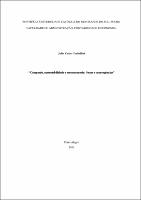| Share record |


|
Please use this identifier to cite or link to this item:
https://tede2.pucrs.br/tede2/handle/tede/3972Full metadata record
| DC Field | Value | Language |
|---|---|---|
| dc.creator | Corbellini, Julio Cesar | - |
| dc.creator.Lattes | http://buscatextual.cnpq.br/buscatextual/visualizacv.do?id=K4750254D1 | por |
| dc.contributor.advisor1 | Moraes, Gustavo Inácio de | - |
| dc.contributor.advisor1Lattes | http://buscatextual.cnpq.br/buscatextual/visualizacv.do?id=K4736615J6 | por |
| dc.date.accessioned | 2015-04-14T14:27:09Z | - |
| dc.date.available | 2014-05-30 | - |
| dc.date.issued | 2013-08-30 | - |
| dc.identifier.citation | CORBELLINI, Julio Cesar. Camponês, sustentabilidade e metaeconomia : nexos e convergências . 2013. 68 f. Dissertação (Mestrado em Economia do Desenvolvimento) - Pontifícia Universidade Católica do Rio Grande do Sul, Porto Alegre, 2013. | por |
| dc.identifier.uri | http://tede2.pucrs.br/tede2/handle/tede/3972 | - |
| dc.description.resumo | Nesse trabalho, tendo a sustentabilidade como nexo, sob um ponto de vista teórico e normativo, se estuda o comportamento econômico camponês, primeiro, nos limites da metaeconomia, conceito elaborado por Ernst Friedrich Schumacher, e segundo, nos limites da teoria microeconômica vigente. Considera-se consensual ser a sustentabilidade um problema cuja solução é de interesse social e global e analisa-se a propensão e potencialidade do camponês para promovê-la. Aborda-se a metaeconomia como um referencial normativo que promove sustentabilidade e que possibilita justificar a consistência e plausibilidade do comportamento camponês. O trabalho de Schumacher é estudado sobre quatro eixos: a sua crítica à ciência econômica neoclássica e três das suas proposições, a da prevalência da pessoa na economia, a de ser pequeno e a das tecnologias apropriadas. Considera-se que essas três evocam todas as demais proposições da metaeconomia. Com base na prática econômica do camponês e na sua conformidade com a metaeconomia procura-se representar o seu comportamento com uso do formalismo da microeconomia e dos modelos de crescimento, constituindo-se assim um modelo microeconômico camponês de produção e de crescimento. O modelo é apresentado na forma de matrizes nas quais estão presentes estoques e fluxos físicos e uma contabilidade que leva em conta o fato de o camponês ser ao mesmo tempo produtor, consumidor e investidor. Ao final, argumenta-se que o modelo camponês, teórico-normativo, é consistente e compatível com os requisitos da sustentabilidade do ser humano e do seu meio. O trabalho se fundamenta na análise da literatura disponível. Objetiva-se contribuir com a chamada de Schumacher para o estudo de uma economia mais humana. | por |
| dc.description.abstract | In this paper peasant economic behavior will be studied using sustainability as a nexus and from a theoretical and normative point of view, first within the framework of metaeconomy , concept created by Ernst Friedrich Schumacher, and secondly within the framework of the prevalent microeconomic theory. Sustainability is generally considered to be a problem whose solution is socially and globally important and this work will analyze the tendency and potential of the peasant to promote this solution. This paper will tackle metaeconomy as a normative reference to promote sustainability and allow the justification of the consistence and plausibility of peasant behavior. Schumacher s work is studied along four lines: his criticism of neoclassical economic science and three of his propositions, the importance of people in the economy, being small and appropriate technology . Together, it is considered that these three concepts evoke all the rest of the concepts belonging to metaeconomy . With a basis in the economic practices of the peasant and in his conformity with metaeconomy this work attempts to represent his behavior using microeconomic formalism and growth patterns, creating a microeconomic peasant model of production and growth. The model is presented via matrixes in which the stocks and physical flows are present as well a model of accountancy based on the fact that the peasant is at once producer, consumer and investor. Finally, I argue that this theoretical-normative peasant model is consistent and compatible with the sustainability requirements for human beings and their environment. This work is based on analysis of available literature. Its objective is to contribute to Schumacher s call for the study of a more human economy. | eng |
| dc.description.provenance | Made available in DSpace on 2015-04-14T14:27:09Z (GMT). No. of bitstreams: 1 458446.pdf: 954432 bytes, checksum: 15d6e5aca11b192a6404847d3730ad75 (MD5) Previous issue date: 2013-08-30 | eng |
| dc.format | application/pdf | por |
| dc.thumbnail.url | http://tede2.pucrs.br:80/tede2/retrieve/13009/458446.pdf.jpg | * |
| dc.language | por | por |
| dc.publisher | Pontifícia Universidade Católica do Rio Grande do Sul | por |
| dc.publisher.department | Faculdade de Administraç, Contabilidade e Economia | por |
| dc.publisher.country | BR | por |
| dc.publisher.initials | PUCRS | por |
| dc.publisher.program | Programa de Pós-Graduação em Economia do Desenvolvimento | por |
| dc.rights | Acesso Aberto | por |
| dc.subject | ECONOMIA - ASPECTOS AMBIENTAIS | por |
| dc.subject | SUSTENTABILIDADE | por |
| dc.subject | TRABALHADORES RURAIS | por |
| dc.subject | ECONOMIA - TEORIAS | por |
| dc.subject.cnpq | CNPQ::CIENCIAS SOCIAIS APLICADAS::ECONOMIA | por |
| dc.title | Camponês, sustentabilidade e metaeconomia : nexos e convergências | por |
| dc.type | Dissertação | por |
| Appears in Collections: | Programa de Pós-Graduação em Economia do Desenvolvimento | |
Files in This Item:
| File | Description | Size | Format | |
|---|---|---|---|---|
| 458446.pdf | Texto Completo | 932.06 kB | Adobe PDF |  Download/Open Preview |
Items in DSpace are protected by copyright, with all rights reserved, unless otherwise indicated.




